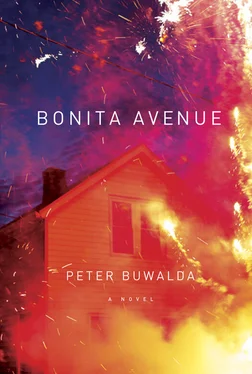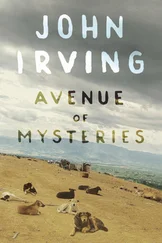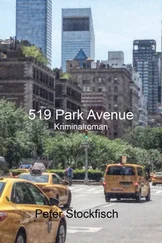For a good few minutes he lies there for dead. The rising and falling of his chest. His teeth chatter, from the exertion, from the stress, from the cold: there’s a sharp nip in the air. The chill bites into his wet body. Then, with a shock, he comes to his senses: the bastard might come back. With a knife. Or a gun. How could he be so stupid as to let him go? He should have held on to him, here, in a headlock. Jesus, he let a psychopath escape from a headlock. “ Damn, ” he whispers.
He gets up — everything hurts, his tendons seem shortened by half, he’s covered with welts and blood, his chin is bleeding, the skin’s been chafed off — and walks through the bathroom into the bedroom. What was he supposed to do? Hold on to the bastard until after the holidays? Listening keenly, keeping an eye on the open door leading to the front hall, he dresses as quickly as possible, pulls on his underwear and his pants, grabs a boating sweater from a chair in the corner of the room, his eyes glued on the doorway. He pulls on his socks, wriggles his feet into his shoes. He hears noise in the distance, banging in the living room, like heavy falling objects — what’s that lunatic up to? What should he do? Call the police?
Regardless of whether he wants to, or whether it’s wise, all the phones are in the living room. His keys too. He could leave via the front door, get himself to safety. He could walk to the campus. Or to the neighbors. But then what? Tell all? He ties his laces without losing sight of the doorway. No. He decides to do nothing for the time being. He crawls onto the bed and gropes around the floor on Tineke’s side. Good, that hockey stick is there after all. Joni’s old stick that Tineke has kept there since he moved to The Hague. But he changes his mind and goes back into the dressing room. The nunchuk is lying on the floor among the shoes scattered around the rack.
With the weapon in his hand he goes to the bedroom doorway and peers around the black curl of the stairs into the dark abyss of the front hall. There is light at the other end, a yellow glow through the frosted glass. He waits for several minutes. At times he imagines he hears something above his own panting, a soft shuffling, footsteps. He’s taken a pretty fair beating, he’s a purplish blue where the iron handles hit him, his ribs are bruised, maybe broken. He is so cold that he crouches down, as close as possible to the warm floor tiles. He keeps replaying the scuffle, that unreal sensation of the moment he let rip. The convulsing, suffering body of his son underneath him, his smell, the defenselessness of that arm, the snap.
He can’t stay crouched here forever. Gripping the nunchuk loosely in his hand he tiptoes toward the living room. There is an irregular trail of blood specks on the slate floor. He passes the front door, realizes he’s locked it from the outside: he can’t even get out of the house — well yes, like a thief through a window. He stops at the living room door. With eagle eyes he peers through the thick glass, but sees nothing. Wait a bit longer. Give him time to bugger off, maybe he’s gone already, given in, beaten, cured of his vengeance once and for all — maybe everything will just resolve itself. Maybe he should quit thinking that.
There is blood on the door handle, he pushes it downward, the sweat that wells up out of his fingers cools off on the cold brass. He gives the door a shove and takes a step back. From the hall he gazes into their living room, once a haven of comfort and security. It is quiet, it exudes warmth. No one is seated in any of the chairs, the sofas are empty. Here and there, flecks glisten: blood. The only place danger could lurk is directly to the right, next to the doorpost. He takes a step forward and lashes out with the nunchuk, the handle smacks against the brickwork, mortar rustles to the floor. Three strides and he’s standing in the middle of the room, he looks around.
The sheetmetal drawers of the buffet against the far wall have been pulled out and shaken empty — good work for someone with just one arm. The floor is littered with paper, binders of household statements, pens, a hole punch that has spewed out its confetti. He smells the sharp odor of alcohol. The liquor cabinet, on the opposite wall, is open, two splintered bottles lie on the stone floor in their bodily fluids.
Wilbert could be in the sunroom, or the kitchen. Or in the wine cellar. His cell phones are lying on the coffee table, just where he left them. The house telephone isn’t in its cradle, he doesn’t see it anywhere. If the kid has a weapon, then this is the wrong place to stand: nowhere to take cover, a perfectly illuminated target. But if he does have a gun, why didn’t he use it in the first place?
“Wilbert?” he calls. His voice sounds murky, unsteady, he clears his throat and waits. The snow beats gently against the windowpanes.
“Wilbert? I know you can hear me.” Without any forethought he has just started talking. How deep is his conviction that words are preferable to physical force? How naïve is that conviction? “If you’re still here,” his voice echoes, “then I know you’re listening. You don’t have to say anything. Just listen to me. I don’t have that money. It’s back in the bank. But listen. If it’s about money”—he is out of breath, the tension is getting the better of him. He swallows, pauses.
“If it’s really about money,” he says, “then we should talk. Man to man. We’ve already fought. I’m done fighting, believe me.”
The silence is consummate. His brain produces primal screams and gunshots, but the silence persists.
“We shouldn’t fight, Wilbert. We should talk. About you, about the future. Wilbert?”
To show he really means it, he crouches down and slides the nunchuk away from him across the floor, a meter, it’s a halfhearted gesture, entirely improvised. He raises his empty hands to chest level, palms facing the dark hole of the sunroom.
“Wilbert. I’ve been thinking about you. Maybe you don’t believe me, but it’s true. Not just now, no, but for the past few years. What am I saying — I’ve thought about you from the very beginning. Do you hear me?”
He stops talking. This is pathetic. It’s too late.
And still he continues: “I know you hold a grudge against me, I know that. But it goes both ways. I also blame you. But listen, we’re still young, both of us. But you, you’re really young. I’ve realized that. When I was your age, Wilbert, you hadn’t even been born yet.”
This is not entirely true, and he wonders if what he wants to say is in fact true. It feels like he’s onstage, he’s observing himself from a box seat, and what he sees is a mediocre actor, a man standing there trying to save his own skin with untruthful, poorly rehearsed lines. And yet he means every word of it.
“It’s not a lost cause, in fact nothing’s been lost. You’re a free man, and I am your father. Wilbert. All I want is for you to go out there and lead a normal life. And I want to help. Do you hear me? Let’s just consider this … altercation as us having hit bottom. We’ve hit rock bottom. Let’s—”
At that moment the telephone rings. The electronic chirp of the landline gives him such a jolt that his heart nearly stops. The ring begins in the empty cradle and reverberates as an echo from the kitchen — the cordless handset. Is he in there too? The electronic melody goes on forever. Is he standing there holding the thing? The answering machine clicks into action, the speaker is turned on as always, they’ve never been able to figure out why. He hears his own low, strange, self-satisfied voice recite their names and ask the caller to leave a message. The beep, and then his wife:
“Hi honey, how are you? I thought I’d just phone to wish you a good trip tomorrow … but I guess you’re already in bed. You’re bushed, I’ll bet. I hope you get a good night’s sleep and feel rested tomorrow in the car. Now, um … everything’s fine here, there’s a good layer of snow. Hans and Ria got here yesterday, we’re having a ball. We miss you! Well … See you tomorrow. Make yourself a hot-water bottle. It’s colder up there than here, Hans says. Bye, sweetheart. Drive safely.” When she hangs up it sounds like a slap to his ear; a nervous busy signal echoes through the living room.
Читать дальше












